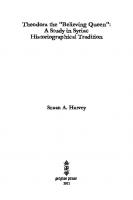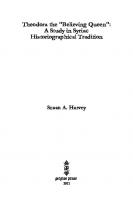Herodicus the cratetean : A study in anti-platonic tradition 9780367143954, 9780429031830
178 29 76MB
English Pages 175 Year 1941
Half Title
Title Page
Copyright Page
Original Title Page
Dedication
Contents
I. An Epigram
Recommend Papers

- Author / Uploaded
- Ingemar Düring
File loading please wait...
Citation preview
Routledge Revivals
HERODICUS
HERODICUS THE CRATETEAN
A STUDY IN ANTI-PLATONIC TRADITION BY
IN GEMAR DÜRING
First published in 1941 by Wahlström & Widstrand This edition first published in 2018 by Routledge 2 Park Square, Milton Park, Abingdon, Oxon, OX14 4RN and by Routledge 52 Vanderbilt Avenue, New York, NY 10017, USA Routledge is an imprint of the Taylor & Francis Group, an informa business © 1941 by Taylor and Francis All rights reserved. No part of this book may be reprinted or reproduced or utilised in any form or by any electronic, mechanical, or other means, now known or hereafter invented, including photocopying and recording, or in any information storage or retrieval system, without permission in writing from the publishers. Publisher’s Note The publisher has gone to great lengths to ensure the quality of this reprint but points out that some imperfections in the original copies may be apparent. Disclaimer The publisher has made every effort to trace copyright holders and welcomes correspondence from those they have been unable to contact. A Library of Congress record exists under ISBN: 80025246 ISBN 13: 978-0-367-14395-4 (hbk) ISBN 13: 978-0-429-03183-0 (ebk)
KUNGL.
VITTERH ETS
HISTORIE
AKADEM IENS
HANDLINGAR,
OCH
AN TIKVITETS
DEL
51:2
H E R O D I C U S THE C R A T E T E A N A S T U D Y IN A N T I - P L A T O N I C T R A D I T I O N
BY
INGEMAR DURING
STOCKHOLM
WAHLSTROM
1941
& W IDSTRAND
(i k o m m i s s i o n )
K U N G E . V IT T E R H E T S H IST O R IE a n t ik v it e t s
L IN G A R
a k a d e m ie n s
U T G IV A S M ED
OCH
HAND-
A N SI,A G
UR
H U M A N IST ISK A F O N D E N
G dTEBORG 1941 EEANDERS B OKTR YCKER I AKTIRBOI, AG
CONTENTS Page
I. An Epigram ................................................................................ II.
The Essay llg o g
......................................................
12
I n t r o d u c t i o n ........................................................................................ T e x t .................................................................................................................. 1. O i and (pihooocpiag CTQarrjyol ............................................................... 2. De anachronismis .................................................................................... 3. De simultate, quae inter Platonem et Xenophontem intercessit ... 4. Philosophi maledicentiores quam comici sunt ................................. 5. De scriptis et discipulis Platonis .......................................................... C o m m e n t a r y ............................................................................................. 1. The Soldiership of Socrates ................................................................... 2. Anachronisms ............................................................................................. 3. The Pretended Jealousy between Plato and X en o p h o n ................ 4. The Calumny of the Philosophers.......................................................... 5. On Plato’s W ritings and Disciples ......................................................
12 18 18 20 24 27 36 41 41 46 54 63 81
The Treatise II sqI S vjutiogicov ..................................................
90
A. B.
C.
III.
rov 0dooa>xQdrrjv
5
A. B.
I n t r o d u c t i o n ........................................................................................ 90 T e x t .................................................................................................................. 106
IV.
The K(ou(pdovu£voi and the other writings ............................ 125
V.
The Anti-Platonic Tradition ................................................... 132 1. 2. 3. 4. 5. 6. 7. 8. 9. 10. 11.
Introduction ............................................................................................. The Com edy................................................................................................. The Isocrateans and Other Contemporaries ..................................... Politics. Demochares ............................................................................ The Epicureans ........................................................................................ Peripatetic Biography ........................................................................... Conclusions ................................................................................................. Herodicus and his Follow ers................................................................... Ducian and Aristides ................................................................................ The Christian Fathers ............................................................................ Conclusion .................................................................................................
132 137 143 147 151 153 155 157 161 163 171
I.
AN E P I G R A M
On September 29th 146 B. C.1 Ptolemy V II seizes the reins of the government in Alexandria after his brother Philometor, who had suddenly been killed b y accident in Syria.
He named himself Euer-
getes, but his loyal subjects called him Cacergetes or Physcon. For more than twenty years he had aspired to the throne and at several times had approached his goal within a hair's breadth.
Philome
tor had had his brother's life in his hands at least twice, but spared him. Euergetes on the contrary shows no forbearance. The legiti mate heir of the throne, Eupator, is made away with. Aristarchus, the famous teacher of the young prince, and with him all the more prominent learned men of the Museum, fled terror-stricken. An officer of the Guard, Cydas, was appointed President of the Royal Academy of Alexandria. This diaspora can only be compared with the flight from Con stantinople during the first half of the X V century.
Not without
grim humour the renaissance of art and letters in the world outside Alexandria, caused b y this flight, is depicted b y Andron:12 ' Ale^av-
dqelg eloiv oi naidevoavreg navrag rovg ''EXXrjvag xal rovg j3aq(}dqovg, exkeiTZOvarjg rjdrj rfjg eyxvxUov naideiag 8ta rag yevofievag ovve%elg xivijoeig ev roig xara rovg ' AXetgdvdqov 8ia8o%ovg %qovoig. eyivero ofiv avavecooig nahv naibeiag djzdorjg xara rov gfidopov fiaoiXevoavra A ly v nrov Ilrolejualov, rov xvqicog vno ra>v ’AAegavdqdoov xaXovjuevov Kaxeqyirrjv. ovrog yaq noXXovg r(bv 3AXe£avdq6cov ajzoo(pd£ag ovx dMyovg 8e xal (pvyadevoag rcbv xara rov adelcpov avrov ecprjfirjodvrcDv, inoirjoe nhr\q£ig rag re vr\oovg xal noXeig avdqdjv yqajti/ianxcbv quXooocpcDV yecojuerqcov jliovoixojv £(joyqaq)(ov naidorqi/icbv re xal larqdjv xal aXXcov noXXcbv rexvircov, 1 Recalculated according to the Julian calendar from the Ptolemaic Table of K in gs, see W achsmuth, Einleitung in das Studium dev alten Geschichte, p. 305. 2 ev r olg XqovvxoZg, F H G I I 352, FrGrHist 246 P i. He lived in the first cen tu ry B. C. and adduces an eye-witness, Menecles from Alexandria.
6
INGEMAR DURING
did ro neveodai diddoxovxsg a rfdoxavxo n ollobg xaxEOXsvaoav avdqag iXloyifiovg.1 ol
The brutality of Physcon was severely upbraided throughout the world.i2 But in Pergamon only malignant delight was felt at the sufferings of the learned competitors. With triumphant scorn, Herodicus the Cratetean writes the following epigram.34
0svy£x\ 9Aqioxaq%Eioi, in evqeol vcbxa OaMoorjg 'EAAada, xfjg £ov6fjg dsiloxsqoi XEjuadog, ya)viof}6jbi(3vx£g, juovoovXXafioi, oloi juEjbirji.E to ocplv xal ocpcbiv xal xd julv fjdi x6 viv. xovO9 vjulv Eirj dvonijuipEiov. 'Hqodlxq) di 'EXXag &eI /iipivoi xal Osonaig Bajivhdv. i daAdrrrjg A superscr. ov C
4 xal
to
acpddv Pierson
5 dvanefitpeXov A dvanefitpeXoi
This epigram is so instructive that it may be taken as a startingpoint in drawing the background for the person and activity of Herodicus. Herodicus names himself a Babylonian. This means that he was from Seleucia like Diogenes 6 BapvXibviog* and he hopes that, in contradistinction to the Aristarcheans, he will be allowed to stay in Hellas.5* The language is, just as in the Aspasia poem quoted below, highly homerizing. 1 Cfr lu st. X X X V I I I 8,3. Aristarchus died on Cyprus, his most prominent dis ciple Apollodorus, the author of the Xgovixa, settled in Athens, another disciple, Dionysius Thrax, withdrew to Rhodes. W hen Physcon had spent his fury and m at ters were becoming more quiet, another disciple of Aristarchus of the name of Ammonius succeeded Cydas as President of the Museum. See Ed. Schwartz, Ges. Schr. I, 1938, p. 90 ff. 2 Diod. X X X I I I , in fine. 8 A th. 222 A. 4 Strabo X V I 1,16 p. 743. IldAai /nev ofiv fj BapvAwv tfv /urjxgonoAig xfjg 9Aoavglag, vvv de ZeAevxeia, fj in i xq> Tiygei xaAovfievrj. . . cooneg de BafivXwviav xr)v ycogav xaAovfiev, ovxa> xal xovg avdgag xovg exeldev BafivAcoviovg xaAovfxev, ovx and xfjg noAecog aAA9 and rfjg ycbgag' and de xfjg ZeAevxeiag fjzxov, xdv exeldev (hoi, xadaneg Aioyevr) rov Zxauxov yiAooofpov. Diog. Uaert. V I 81 xaAovfievog de BafivAcdviog did xfjv yeixovlav. 5 Th. Bergk, F u n f Abh. zur Gesch. d. griech. Philosophie u. Astronomie, Eeipzig 1883, p. 169, suggests the reading IlegyafF del or MaAAog del. The latter is at
HERODICUS THE CRATETEAN
in
evgia vd>xa daXaoorjg.
7
If Herodicus really wrote OaXaxxrjg, he
must be supposed to have meant it as an allusion to the af fected learning of grammarians who preferred the A ttic forms. Y et this seems to me very uncertain. Much later, when A tti cism was in its prime, rhetors and grammarians were com monly derided on account of this craze; there are several epi grams of this kind in the X lth book of the Anthology.
xejudg, II. K 361. olot fie/irjXe, a well-known Homeric expression. dvonifjupeXog belongs to the learned glosses of Homer, the meaning of which was uncertain, as may be seen from Zenodotus’ attempts at interpretation I I 748. I suppose Herodicus used the word in the same sense as when Hesiodus Op . 618 speaks of vavxiXtrj dvonifupeXog. He wishes the Aristarcheans »a stormy passage ». The fhfihaxol yagaxlxai Movoecov iv xaXagco were ridiculed already by Timon fr. 60 W. (= 12 D.), and the Anthology is rich in epigrams of the same kind and in the same style. All of them, however, are later than that of Herodicus. Meleager says in his own epitaph V II 419 ov deonaig rjvdgcooe Tvgog. There is a long series of epigrams directed against grammarians, rhetors and expressly against the Aristarcheans, mainly from the golden age of Atticism during the reign of Augustus
and Tiberius.
Thus Antipater begins X I
20







![Spontaneity and Tradition: A Study in the Oral Art of Homer [Reprint 2020 ed.]
9780520320758](https://ebin.pub/img/200x200/spontaneity-and-tradition-a-study-in-the-oral-art-of-homer-reprint-2020nbsped-9780520320758.jpg)

